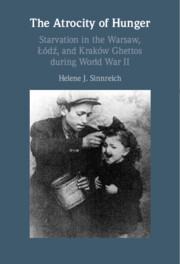The Atrocity of Hunger
During World War II, the Germans put Jews in Nazi-occupied Poland into ghettos which restricted their movement and, most crucially for their survival, access to food. The Germans saw the Jews as “useless eaters,” and denied them sufficient food for survival. The hunger which resulted from this intentional starvation impacted every aspect of Jewish life inside the ghettos. This book focuses on the Jews in the Łódź, Warsaw, and Kraków ghettos as they struggled to survive the deadly Nazi ghetto and, in particular, the genocidal famine conditions. Jews had no control over Nazi food policy, but they attempted to survive the deadly conditions of Nazi ghettoization through a range of coping mechanisms and survival strategies. In this book, Helene Sinnreich explores their story, drawing from diaries and first-hand accounts of the victims and survivors. This title is also available as Open Access on Cambridge Core.
Helene Sinnreich is Director of the Fern and Manfred Steinfeld Program in Judaic Studies at the University of Tennessee, Knoxville. She is the co-editor-in-chief of the academic journal Holocaust and Genocide Studies and was the founding editor of the Journal of Jewish Identities. She has served as a fellow at the United States Holocaust Memorial Museum in Washington, DC, and at Yad Vashem in Jerusalem. She is the editor of the book A Story of Survival: The Lodz Ghetto Diary of Heinek Fogel (2015).

